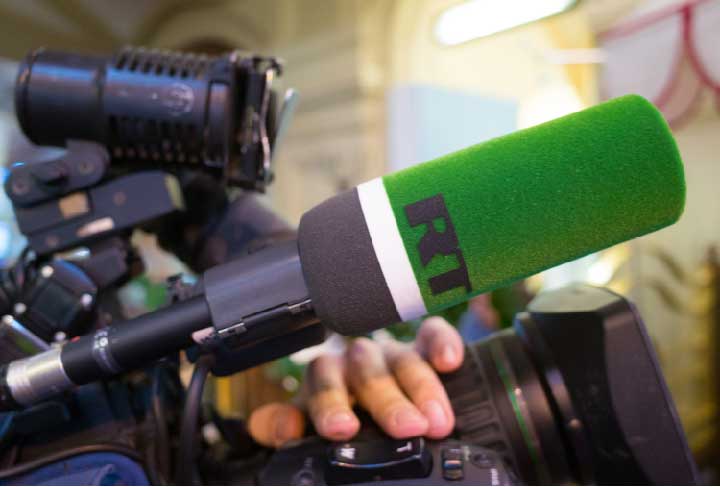Russia
Last week, Russian officials and state-funded media continued to push back on accusations that the Kremlin abused its dominance in the European energy market to cause the continent’s gas shortage. Moscow-linked outlets amplified President Vladimir Putin’s comments on the issue at a Russia Energy Week forum. When asked if Moscow was weaponizing its gas reserves to pressure European governments, President Putin said, “Russia is not using any weapons.” He asserted that Russia “flawlessly fulfills its contractual obligations to our partners.” Embassies and state-controlled media also circulated claims by President Putin that the gas shortage was caused by European officials introducing “systemic flaws” into the energy system. Nord Stream 2 and other Russian gas pipelines were presented as the means to regain stability and predictability in Europe’s gas market.
Russian state-backed outlets also took aim at the United States last week, highlighting the country’s struggles with racism and pandemic-related economic disruptions. The United States’ simultaneous recognition of Columbus Day and Indigenous Peoples’ Day last week was covered extensively by Kremlin media, with left-leaning outlet Redfish circulating a video compilation of U.S. protestors toppling and damaging divisive monuments. Moscow-funded outlets also criticized the Biden administration’s management of supply-chain bottlenecks, with RT warning the supply constraint “jeopardizes both Thanksgiving and Christmas.” Sputnik news used #EmptyShelvesJoe in tweets about the issue.
Finally, Kremlin-linked Twitter showcased videos of Western protests against pandemic restrictions and boasted of new Sputnik V coronavirus vaccine deliveries to countries including Iran, Venezuela, Mexico, and Serbia. The account also touted Sputnik V as “one of the world’s leading standalone vaccines.” Meanwhile, state media noted that Russia had reached a daily record of coronavirus deaths and infections, with hospitals struggling to keep up with patient demands.
China
Last week, Chinese diplomats and state media accused various critics of the Chinese Communist Party of lying in exchange for foreign money. On Monday, a CGTN affiliate “revealed” that one of the witnesses in the Uyghur Tribunal currently taking place in London had received £43,000 from the tribunal’s organizers. Later during the week, Xinhua and the People’s Daily were among those relaying a Zimbabwean report that the U.S. embassy was paying reporters to dig up dirt on China.
While global media outlets widely reported that LinkedIn’s decision to shut down its “localized” version of its platform in China (to be replaced by a platform striped of social media features) was a result of the ever-stricter internet censorship in China, Chinese state media presented the move as a “shift in strategy” and denounced the “false information” from “Western media outlets such as BBC and the New York Times.” Chinese state media similarly minimized or contested Harvard’s decision to move its Chinese language program to Taiwan, with only six tweets referencing the decision.
In his Monday press conference, Chinese Ministry of Foreign Affairs (MFA) spokesperson Zhao Lijian did not elaborate on a People’s Liberation Army statement about “unreasonable demands” made by India, simply adding that the demands were “unreasonable and unrealistic” when further pressed on the issue. During the week, state media employees shared videos of captured Indian soldiers and Zhao praised the “great importance” of China-Pakistan ties.
As has become customary, statements by Russian officials were brought up in the Chinese MFA’s press conferences on Monday, Tuesday, Thursday, and Friday. From support for Nord Stream 2 (“[the] project shows energy complementarity between Russia and Europe”) to joint opposition to Taiwan’s independence (“China firmly supports Russia’s efforts to safeguard sovereignty and regime security”) to common concerns over AUKUS, Beijing stressed its geopolitical alignment with Moscow. Finally, the MFA addressed the former Pentagon software chief’s statement that the United States was losing ground to China in AI. While spokesperson Zhao simply repeated China’s opposition to cyber-attacks, state media outlets like CGTN-affiliate T-House and CGTN Russia amplified the ex-software chief’s message.
Iran
A shooting in Beirut that targeted supporters of Hezbollah and the Amal movement received heavy coverage in Tehran-linked media last week. Press TV claimed that one perpetrator was an employee of the U.S. embassy in Beirut. This echoed more explicit accusations made by Hezbollah leadership—and reported on widely in Iranian outlets—that the United States had been involved in the attack. The Iranian foreign ministry called on Lebanese authorities to bring the attackers to justice. Earlier in the week, Hezbollah’s leader Hassan Nasrallah had condemned an IS-K led attack on Shiite worshippers in Kunduz, Afghanistan, and said that the United States bears responsibility. Iranian coverage framed Hezbollah as both strong and restrained and accused Hezbollah’s opponents of falsely blaming them for last year’s port explosion to marginalize them politically. Fars News reported on a Hezbollah member of parliament’s accusation that the United States, Saudi Arabia, and other Gulf countries had been planning this attack since last year.
Iranian press also reported heavily on a series of attacks perpetrated by IS-K against Afghanistan’s Shiite minority. Press TV, for example, amplified remarks by Russian President Vladimir Putin that alleged that 2,000 IS-K fighters are in northern Afghanistan, and blamed the United States for the dire state of the country. These comments echoed Iran’s envoy to the EU, who blamed “Afghanistan’s invaders” and called on European countries to accept more refugees and provide more aid to Afghanistan. Finally, Iranian media continued to amplify criticism leveled at Biden from both the political right (including criticism of mask mandates and amplification of comments from former President Trump) and the political left (namely around immigration, climate, and human rights issues).
The views expressed in GMF publications and commentary are the views of the author alone.








